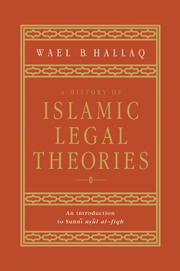3 - The articulation of legal theory: II
Published online by Cambridge University Press: 05 October 2013
Summary
INTRODUCTORY REMARKS
armed with the knowledge of hermeneutical principles, legal epistemology and the governing rules of consensus, the mujtahid is ready to undertake the task of inferring rules. Inferring rules presupposes expert knowledge in hermeneutics because the language of the texts requires what may be called verification; namely, establishing, to the best of one's ability, the meaning of a particular text as well as its relationship to other texts that bear upon a particular case in the law. For this relationship, as we have seen, may be one of particularization, corroboration or abrogation. Before embarking on inferential reasoning, the mujtahid must thus verify the meaning of the text he employs, and must ascertain that it was not abrogated by another text. Knowledge of the principles of consensus as well as of cases subject to the sanctioning authority of this instrument is required to ensure that the mujtahid's reasoning does not lead him to results contrary to the established consensus in his school. This knowledge is also required in order to ensure that no case that has already been sanctioned by consensus is reopened for an alternative rule.
The certainty engendered by consensus places the rules subject to this instrument on a par with the Quranic and Sunnaic texts which are semantically unequivocal and which have been transmitted through a multiplicity of channels (tawātur). All other cases, however, are open either to a fresh interpretation or reinterpretation.
- Type
- Chapter
- Information
- A History of Islamic Legal TheoriesAn Introduction to Sunni Usul al-fiqh, pp. 82 - 124Publisher: Cambridge University PressPrint publication year: 1997



